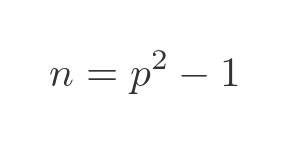This is a past question from the Cambridge University Maths entrance interview. It is an interesting open-ended question with quite a surprising result. Consider the following value n:
Where p is a prime number greater than 3.
The question is: what can you say about the prime factors of n?
Think about it before looking at the answer.
Tackling the problem
Since this is a question about the prime factors of n, a good place to start might be to factorise n itself. We can see that n is a difference of two squares:
This can be factorised into:
So we now have the slightly easier problem of finding the prime factors of (p - 1) and (p + 1).
What can we tell about the factors?
What do we know about the two factors? There are two obvious things we can say:
(p - 1) and (p + 1) differ by 2.
(p - 1), p, and (p + 1) are consecutive.
Not forgetting, of course, we have been told that p is prime and greater than 3.
Finding the factors
Clearly at least one of (p - 1), p, and (p + 1) must be even, because they are consecutive.
But we know that p is a prime, and it isn't 2 (because it is greater than 3). This means that (p - 1) and (p + 1) must both be even.
So both factors are divisible by 2:
We can therefore say that n is divisible by 4.
But we can find out a bit more. Since (p - 1) is even we can write it as:
And since (p + 1) is 2 greater than (p - 1) we can write it as:
Now either k or k + 1 must be even. This means that exactly one of (p - 1) or (p + 1) must be divisible by 4 (the other is only divisible by 2).
So, n is not only divisible by 4, it is actually divisible by 8.
Another factor
That is not all, we can find another factor. Since (p - 1), p, and (p + 1) are consecutive, exactly one of those numbers must be divisible by 3. And we know that p cannot be divisible by 3, because it is a prime number greater than 3.
This means that exactly one of (p - 1) or (p + 1) must be divisible by 3. So, n is not only divisible by 8, it is also divisible by 3.
The result
This gives us the result that any number of the form:

where p is a prime number greater than 3, is divisible by 24.
Let's check that
Let's try a few values.
5 squared is 25. Subtract 1 gives 24.
7 squared is 49. Subtract 1 gives 48 (2 times 24).
11 squared is 121. Subtract 1 gives 120 (5 times 24).
Let's try a bigger prime:
1237 squared is 1530169. Subtract 1 gives 1530168 (63757 times 24).
Did you figure it out?





